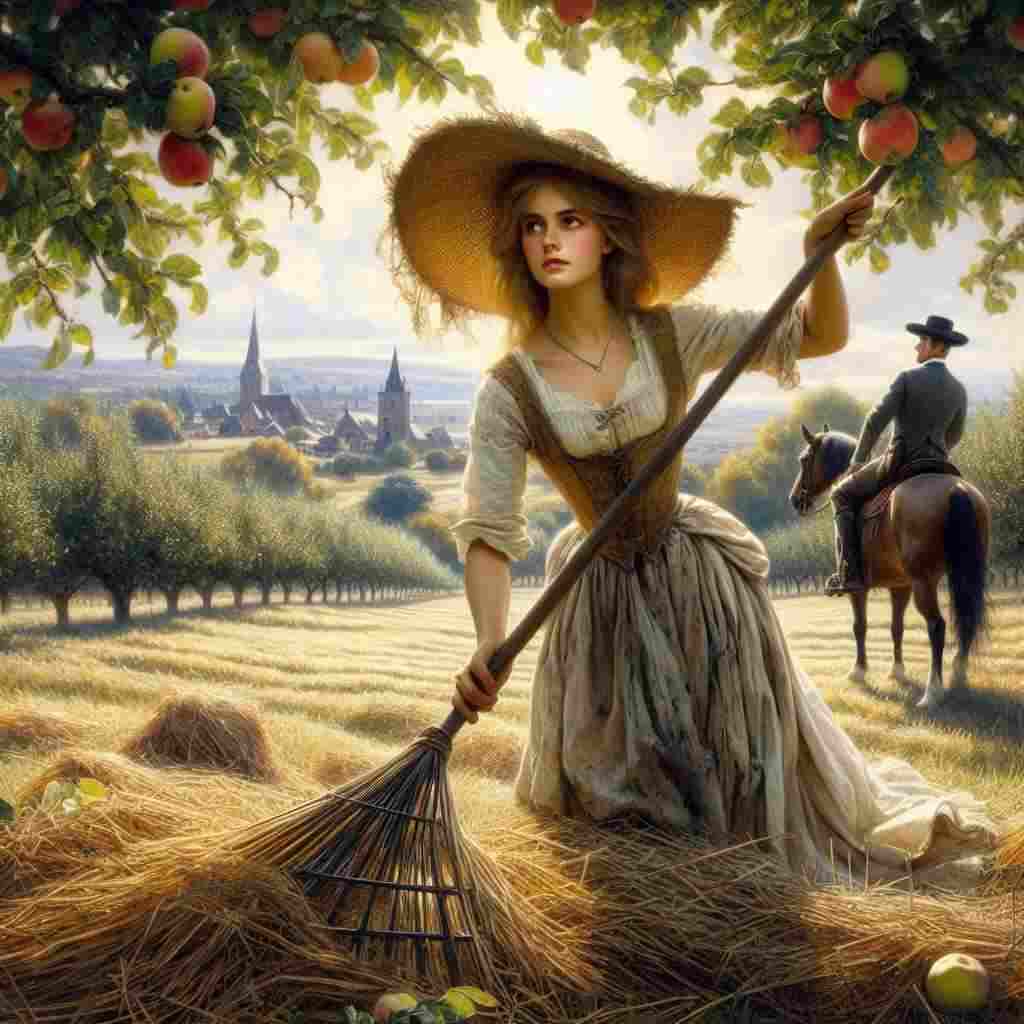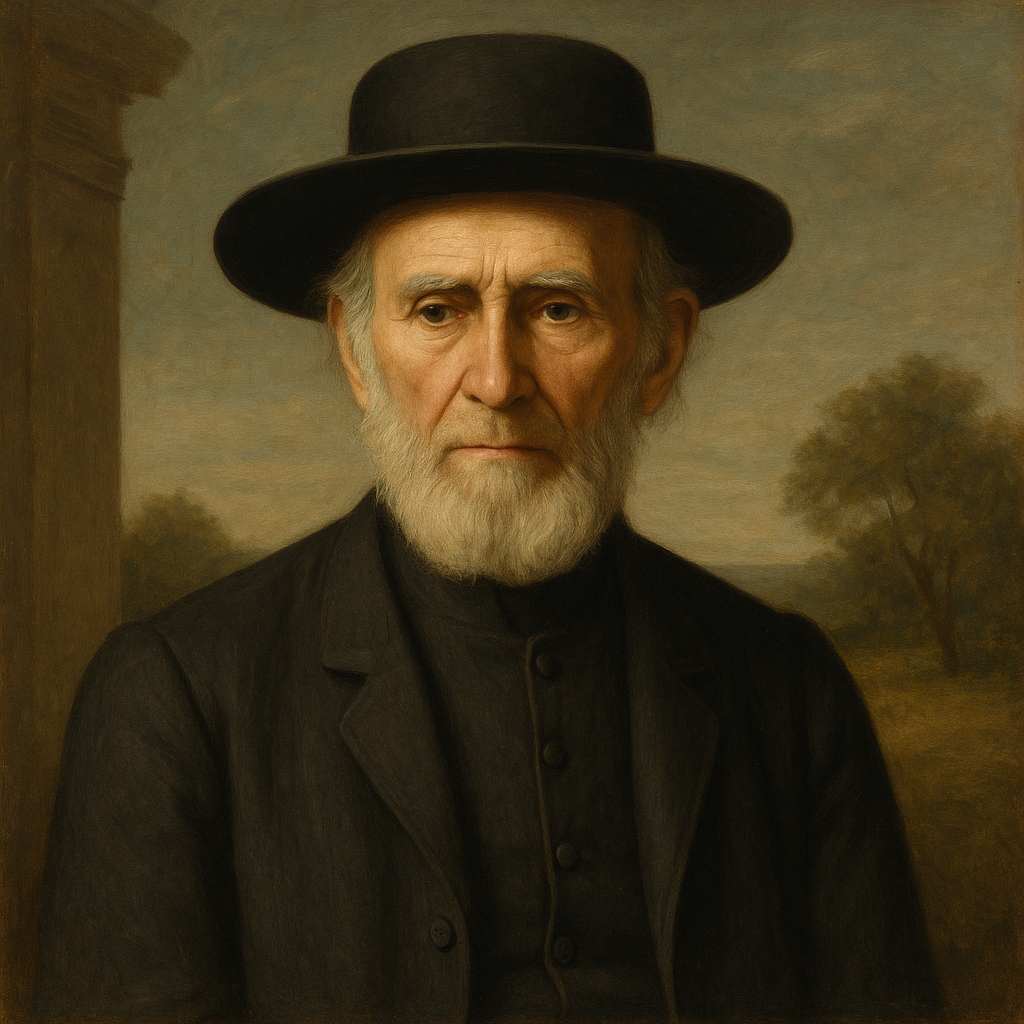Maud Muller
John Greenleaf Whittier
1807 to 1892

Want to track your favorites? Reopen or create a unique username. No personal details are required!
Maud Muller on a summer's day
Raked the meadow sweet with hay.
Beneath her torn hat glowed the wealth
Of simple beauty and rustic health.
Singing, she wrought, and her merry glee
The mock-bird echoed from his tree.
But when she glanced to the far-off town
White from its hill-slope looking down,
The sweet song died, and a vague unrest
And a nameless longing filled her breast,-
A wish that she hardly dared to own,
For something better than she had known.
The Judge rode slowly down the lane,
Smoothing his horse's chestnut mane.
He drew his bridle in the shade
Of the apple-trees, to greet the maid,
And asked a draught from the spring that flowed
Through the meadow across the road.
She stooped where the cool spring bubbled up,
And filled for him her small tin cup,
And blushed as she gave it, looking down
On her feet so bare, and her tattered gown.
"Thanks!" said the Judge; "a sweeter draught
From a fairer hand was never quaffed."
He spoke of the grass and flowers and trees,
Of the singing birds and the humming bees;
Then talked of the haying, and wondered whether
The cloud in the west would bring foul weather.
And Maud forgot her brier-torn gown
And her graceful ankles bare and brown;
And listened, while a pleased surprise
Looked from her long-lashed hazel eyes.
At last, like one who for delay
Seeks a vain excuse, he rode away.
Maud Muller looked and sighed: "Ah me!
That I the Judge's bride might be!
"He would dress me up in silks so fine,
And praise and toast me at his wine.
"My father should wear a broadcloth coat;
My brother should sail a pointed boat.
"I'd dress my mother so grand and gay,
And the baby should have a new toy each day.
"And I'd feed the hungry and clothe the poor,
And all should bless me who left our door."
The Judge looked back as he climbed the hill,
And saw Maud Muller standing still.
"A form more fair, a face more sweet,
Ne'er hath it been my lot to meet.
"And her modest answer and graceful air
Show her wise and good as she is fair.
"Would she were mine, and I to-day,
Like her, a harvester of hay.
"No doubtful balance of rights and wrongs,
Nor weary lawyers with endless tongues,
"But low of cattle and song of birds,
And health and quiet and loving words."
But he thought of his sisters, proud and cold,
And his mother, vain of her rank and gold.
So, closing his heart, the Judge rode on,
And Maud was left in the field alone.
But the lawyers smiled that afternoon,
When he hummed in court an old love-tune;
And the young girl mused beside the well
Till the rain on the unraked clover fell.
He wedded a wife of richest dower,
Who lived for fashion, as he for power.
Yet oft, in his marble hearth's bright glow,
He watched a picture come and go;
And sweet Maud Muller's hazel eyes
Looked out in their innocent surprise.
Oft, when the wine in his glass was red,
He longed for the wayside well instead;
And closed his eyes on his garnished rooms
To dream of meadows and clover-blooms.
And the proud man sighed, and with a secret pain,
"Ah, that I were free again!
"Free as when I rode that day,
Where the barefoot maiden raked her hay."
She wedded a man unlearned and poor,
And many children played round her door.
But care and sorrow, and childbirth pain,
Left their traces on heart and brain.
And oft, when the summer sun shone hot
On the new-mown hay in the meadow lot,
And she heard the little spring brook fall
Over the roadside, through a wall,
In the shade of the apple-tree again
She saw a rider draw his rein;
And, gazing down with timid grace,
She felt his pleased eyes read her face.
Sometimes her narrow kitchen walls
Stretched away into stately halls;
The weary wheel to a spinet turned,
The tallow candle an astral burned,
And for him who sat by the chimney lug,
Dozing and grumbling o'er pipe and mug,
A manly form at her side she saw,
And joy was duty and love was law.
Then she took up her burden of life again,
Saying only, "It might have been."
Alas for the maiden, alas for the Judge,
For rich repiner and household drudge!
God pity them both and pity us all,
Who vainly the dreams of youth recall.
For of all sad words of tongue or pen,
The saddest are these: "It might have been!"
Ah, well! for us all some sweet hope lies
Deeply buried from human eyes;
And, in the hereafter, angels may
Roll the stone from its grave away!
John Greenleaf Whittier's Maud Muller
John Greenleaf Whittier's poem "Maud Muller" is a poignant narrative that explores themes of social class, unfulfilled desires, and the lasting impact of missed opportunities. Through the chance encounter between Maud, a simple country girl, and a refined Judge, Whittier crafts a tale that resonates with the universal human experience of longing and regret.
The poem begins by painting an idyllic pastoral scene, with Maud Muller raking hay on a summer's day. Whittier's vivid imagery immediately establishes Maud's rustic beauty and simplicity, emphasizing her connection to nature and her modest circumstances. The juxtaposition of her "torn hat" with the "wealth of simple beauty and rustic health" beneath it sets the stage for the conflict between simplicity and sophistication that will unfold throughout the poem.
As Maud gazes at the distant town, a sense of discontent and yearning emerges. This moment marks a crucial shift in the poem's tone, introducing the theme of unfulfilled desires. Whittier writes, "A wish that she hardly dared to own, / For something better than she had known," revealing Maud's inner conflict between contentment with her current life and the allure of a different existence.
The arrival of the Judge introduces the element of social class disparity. Their interaction is charged with unspoken attraction and curiosity, as evidenced by Maud's blush and the Judge's lingering departure. Whittier skillfully uses this encounter to highlight the stark differences in their social standings while also suggesting the possibility of a connection that transcends these boundaries.
Following their meeting, both Maud and the Judge indulge in fantasies about a life together. Maud's daydreams focus on material comforts and the ability to help others, reflecting both her humble origins and her kind nature. The Judge, conversely, romanticizes Maud's simple life, imagining an escape from his world of "doubtful balance of rights and wrongs" to one of "health and quiet and loving words." These contrasting visions underscore the grass-is-greener mentality that often accompanies unfulfilled desires.
However, societal expectations and ingrained class consciousness ultimately prevail. The Judge, mindful of his family's pride and social standing, "closes his heart" and rides away. This decision sets in motion the central tragedy of the poem: two lives forever altered by a brief encounter and the subsequent "what if" that haunts them.
Whittier then fast-forwards through time, showing both Maud and the Judge in their respective marriages. The parallel structure of these passages emphasizes the shared nature of their discontent. The Judge, despite his wealth and power, finds himself longing for the simplicity of that summer day. Maud, burdened by the hardships of her life, escapes into fantasies of a grander existence. These sections poignantly illustrate the lasting impact of their unfulfilled connection and the way memory can both comfort and torment.
The poem's most famous lines, "For of all sad words of tongue or pen, / The saddest are these: 'It might have been!'" encapsulate the central theme of regret and lost opportunities. Whittier suggests that the pain of wondering "what if" can be more profound than any actual experience, a sentiment that resonates across time and cultures.
However, Whittier does not end on a note of complete despair. The final stanza offers a glimmer of hope, suggesting that some dreams, though buried, might still be realized in an afterlife. This conclusion adds a spiritual dimension to the poem, hinting at the possibility of redemption or fulfillment beyond earthly constraints.
Throughout "Maud Muller," Whittier employs a range of poetic devices to enhance his narrative. The consistent rhyme scheme and metrical structure lend a musical quality to the verse, evoking the simplicity of a folk ballad. This form contrasts with the complexity of the emotions and social issues explored, creating a tension that mirrors the characters' internal conflicts.
In conclusion, "Maud Muller" is a masterful exploration of human longing, social constraints, and the power of memory. Through its vivid characterization and universal themes, the poem invites readers to reflect on their own unfulfilled desires and the choices that shape their lives. Whittier's work continues to resonate with audiences, serving as a poignant reminder of the complexities of human desire and the enduring impact of the roads not taken.
This text was generated by AI and is for reference only. Learn more
Want to join the discussion? Reopen or create a unique username to comment. No personal details required!



Comments
No comments yet. Be the first to comment!